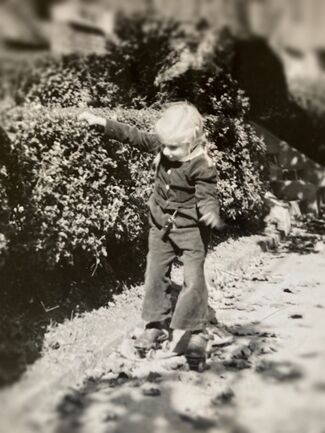|
I was almost six when my father came from the hospital to let me know I had a baby sister. I told him, “Poor daddy, three against one. I’ll be your boy.” My mother wanted me to be a girly girl. What she got was a tomboy, which only added to the list of things she hated about me. When the boys wouldn’t let me play football with them, I bargained with my mother—it was always my mother who made the decisions—if you give me the money to buy a football, I promise I’ll practice for at least half an hour every day with no exceptions. She wanted me to play the piano so I got the football. When I approached the boys they turned me down, as usual, but when they saw my football, they changed their minds. They’d been playing with an old torn soft football. Mine was clearly better. We played shirts and skins. Since I was as flat on top as the boys, I saw no reason not to play skins—without a shirt. My mother was livid. When I pointed out that no one could tell the difference between me and a boy if you couldn’t see our faces, my mother sneered, “Do you have to advertise it?” I shrugged. I was 12. It would be almost three years before I got my period and experienced the subsequent womanly changes in my body.
When I was 14, I was given a birthday check for a hundred dollars. Most of it was to go into a bank account for my education but I was allowed to use a little of it to buy myself a present. Much to my mother’s displeasure, I bought a fishing rod. She was expecting me to buy new clothes and threatened to return the fishing rod to the store, but in one of the rare times my father did not side with her, he said, “Ruth, let her keep it. When we’re at Celeste (the place in the country my parents had north of New York City) we can fish for trout and eat them for breakfast.” I was allowed to keep the fishing rod. I had no friends, so when the daughter of my mother’s friend invited me to attend her Sweet Sixteen birthday party, my mother was thrilled. There was only one problem: she insisted I buy high heel shoes to wear with the dress she’d made me. I told her I didn’t need high heels. I hated how it felt walking in them. I hated how they looked. She said, “No shoes, no party.” So, to spite her, since she didn’t tell me to go to a discount store, I went to Saks 5th Avenue, to the shoe department, and asked the man to show me the lowest heeled shoe that would qualify as “high heels.” He laughed when I told him about my mother’s orders, but he was also sympathetic and brought me several pairs of shoes he thought would qualify. I was dubious—the heels weren’t very high—but he assured me, they were “high” heels. I bought the most comfortable pair and took them home. They weren’t what my mother hoped for, but she had to admit they were high heels. I went to the party, took my shoes off, and put them near the entryway where they stayed until it was time to go home. A very expensive one-night purchase. Small skirmishes in the battle between my mother and me—who she wanted me to be—who I was. It was never an act of rebellion. It was never an act of courage. It was me being me, doing what made me happy, just as Sila was happy when she was swimming. Did you feel you could be who you were when you were a child?
2 Comments
Marlene Simon
10/1/2021 11:16:42 am
I think it is wonderful how you continued to assert yourself and be who you were with a mother who was controlling and unsupportive. It is a testament to your own strong will and survival instincts. Thank you so much for sharing.
Reply
David M. Pody
10/3/2021 06:53:46 am
Nancy bravely faces all challenges that come her way, whether they be social, or medical, or career related. I think her story shows that we all face the chains of parental expectations, but sometimes we are so eager to please our parents we think we have to yield to our parents in order to be "good children."
Reply
Leave a Reply. |
Monthly StoriesStories inspired by world tales to challenge and comfort. Archives
July 2024
Categories |
Copyright © Nancy King 2020 | Site Design by Angulo Marketing & Design
|
|
Nancy King is a widely published author and a professor emerita at the University of Delaware, where she has taught theater, drama, playwriting, creative writing, and multidisciplinary studies with an emphasis on world literature. She has published seven previous works of nonfiction and five novels. Her new memoir, Breaking the Silence, explores the power of stories in healing from trauma and abuse. Her career has emphasized the use of her own experience in being silenced to encourage students to find their voices and to express their thoughts, feelings, and experiences with authenticity, as a way to add meaning to their lives.
|


 RSS Feed
RSS Feed